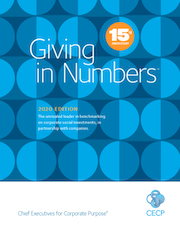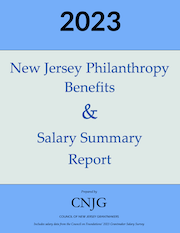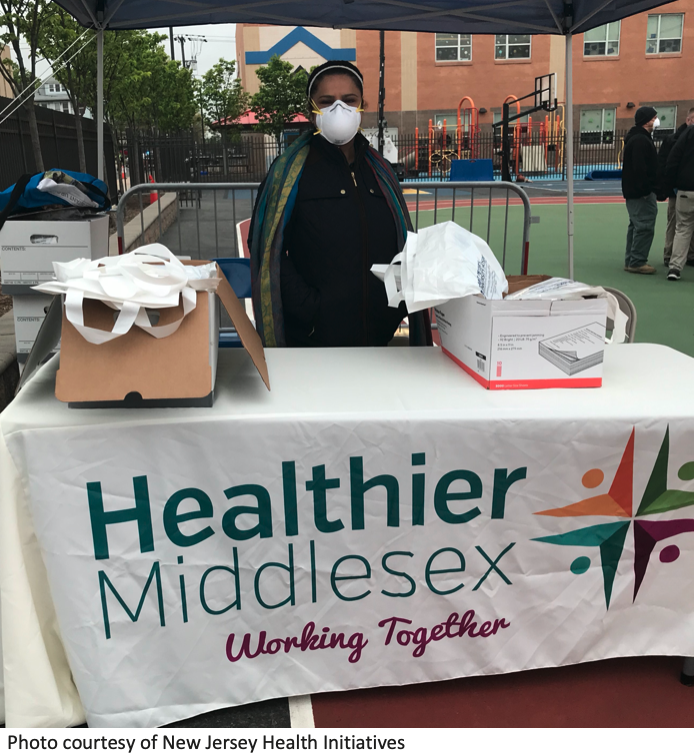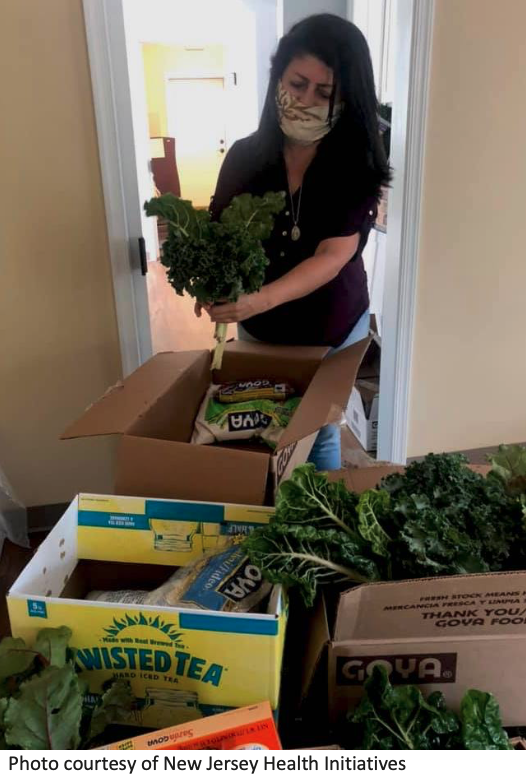Site Search
- resource provided by the Forum Network Knowledgebase.
Search Tip: Search with " " to find exact matches.
Join the Robert Wood Johnson Foundation (RWJF) for a discussion on health and racial equity in New Jersey and how to achieve it. The roundtable discussion will focus on exploring strategies to advance health equity goals across a number of key areas, some of which are those identified in A Policy Agenda for a Healthier, More Equitable New Jersey, which RWJF released earlier this year.
Speakers include:
Maisha Simmons, Robert Wood Johnson Foundation
Atiya Weiss, The Burke Foundation
Sharnita Johnson, Victoria Foundation
Marianna Schaffer, Geraldine R. Dodge Foundation
Alana Vega, The Fund for New Jersey
There will be time for Q & A following the roundtable.
Cost: Free for CNJG Members
Resources:
A Policy Agenda for a Healthier, More Equitable New Jersey
New Jersey Reparations Council
New Jersey Birth Equity Funders Alliance
Neighbors Helping Neighborhoods
New Jersey's Public Health Institute: Advancing Health Equity in New Jersey
Organizing Examples: Make the Road and Wind of the Spirit
This report highlights three philanthropic efforts to build the capacity of local communities in the West - The Ford Family Foundation’s Ford Institute Leadership Program, the Northwest Area Foundation’s Horizons Program, and the Orton Family Foundation’s Heart and Soul Community Planning Program.

CECP’s Giving in Numbers™is the unrivaled leader in benchmarking on corporate social investments, in partnership with companies. It is the premier industry survey and research, providing standard-setting criteria in a go-to guide that has defined the field and advanced the movement. CECP has the largest and most historical data set on trends in the industry, shared by more than 585 multi-billion-dollar companies over nearly 19 years, representing more than $312 billion in corporate social investments over that time span. The report is embraced by professionals across all sectors globally to understand how corporations invest in society, with topics ranging from cash and in-kind/product, employee volunteerism and giving, and impact measurement.
Kessler Foundation approved approximately $2 million in grants in 2021 to support initiatives that promote the inclusion of people with disabilities in the workplace. The Foundation allocated funding for three categories: Foundation-Directed Grants, Community Employment Grants, and Special Initiative Grants. Since 2005, the Foundation's Center for Grantmaking has awarded more than $50 million to nonprofit programs that expand employment opportunities for people with disabilities striving to work, adding diversity to American workplaces, and boosting productivity.
Kessler grantmaking has lead to improved job skills and paid employment for thousands of individuals with disabilities.
The Foundation's contributions have led to improved job skills and paid employment for thousands of individuals with disabilities, according to Elaine E. Katz, MS, CCC-SLP, senior vice president for grants and communications at Kessler Foundation. "Our grants support inventive initiatives that open new pathways to increasing inclusion of people with disabilities in the workplace," she added.
A CNJG member queried our listserves on policies regarding: 1) number of vacation days for new full-time employees; 2) paid time off (PTO); and 3) working remotely. CNJG compiled the answers from responding members.

Native Voices Rising is a joint research and re-granting project of Native Americans in Philanthropy and Common Counsel Foundation. This report focuses on the practices and challenges of community organizing and advocacy, focusing on the need for increased investment in and sustained support for American Indian, Alaska Native and Native Hawaiian communities.
A CNJG member queried our listserves for sample questions (not included in the grant application) you might ask grantees or potential grantees during site visits. CNJG compiled these responses, and other documents members use.
These news articles show our members responses to philanthropy's role in fighting against racism and injustice. If there items we've missed, please email us, and we'll add it.
Actions and Announcements
Johnson & Johnson: A Message from Johnson & Johnson Chairman and CEO Alex Gorsky About Recent Events in the United States
Robert Wood Johnson Foundation: Statement from Richard Besser, MD, on Racial Injustice, Violence, and Health In America
Adam Liebling, Director of Grants Management at RWJF, pens this article re-imagining the work of philanthropy
New Jersey Council for the Humanities: Our resolute commitment to equity and justice through the humanities
Overdeck Family Foundation: Standing in Solidarity, and Lifting Up Stories of Impact
Princeton Area Community Foundation: Eleanor Horne and Jeff Vega pen this opinion piece about how they are working towards racial equity and making their community “a better place for all children”
Smith Family Foundation: Protest and Planning Next Step - A Letter to our City and her Allies
TD Bank: A statement on recent events from Bharat Masrani, President & CEO, TD Bank Group
United Way of Ocean and Monmouth Counties: United We Stand
Victoria Foundation: Statement of Condemnation
These news articles show our members’ responses to the coronavirus pandemic, including announcements, emails, blogs, grants and other resources. If you have items to add, please email us.
Actions and Announcements
Audible Creates Global Center for Urban Development and Hires Aisha Glover to Help Lead It
Russell Berrie Foundation Post: Our Response to COVID-19
Campbell Soup to pay hourly employees premium during outbreak
Post: Our Response to COVID-19
Geraldine R. Dodge Foundation
Dodge signs CoF pledge
Grunin Foundation 3/13 COVID-19 Announcement and 3/31 COVID-19 Update
Johnson & Johnson’s lead COVID-19 vaccine candidate shots for early 2021 authorization
Robert Wood Johnson Foundation
Culture of Health Blog: Handwashing to Slow the Coronavirus Pandemic
Opinion: Racism is the other virus sweeping America during this pandemic by Julie Morita, M.D
Opinion: Disabled Americans can’t be a COVID-19 afterthought by Dr. Richard Besser
Culture of Health Blog: Incarceration Rates: A Key Measure of Health in America
Opinion: In Covid-19 Crisis, Philanthropy’s Attention Must Focus on People With Disabilities
Brief: Health Equity Principles for State and Local Leaders in Responding, Reopening & Recovering from COVID-19
Culture of Health Blog: Lessons for an Equitable COVID-19 Response and Recovery
Kessler Foundation has produced two COVID related podcasts:
Practical Tips to Help Survive the Pandemic as a Parent of a Child with Autism
COVID-19 and Spinal Cord Injury: Minimizing Risks for Complications
New Jersey Council of Humanities Op-ed: Staying Human During the Pandemic
New Jersey Health Initiatives’ Deputy Director of Programs, and CNJG Board Member Diane Hagerman penned “Collaboration across county lines is key to a healthy New Jersey” on NJ Spotlight.
New Jersey Council for the Humanities and New Jersey Historical Commission present a webinar series for cultural nonprofits navigating the COVID-19 pandemic
New Jersey Economic Development Authority assists more than 10,000 small businesses impacted by COVID-19
New Jersey State Council on the Arts partners with ArtPride New Jersey Foundation on “Keep Jersey Arts Alive” campaign.
Newark Arts and the City of Newark Retools Its Ambitious Arts Grant Program to Respond to COVID-19
Nicholson Foundation Email to Grantees
Nicholson honors their own Colette Lamothe-Galette, lost to COVID-19
OceanFirst Foundation and Grunin Foundation along with Townsquare Media Launch Acts of Kindness Campaign
Subaru teams up with TerraCycle on PPE recycling
Turrell Fund Email to Grantees about CARES Act
Turrell Fund manages new Passaic County Pandemic Partnership hosted at the Community Foundation of New Jersey
United Way of Greater Mercer County Op-ed message from Sandra Toussaint
Valley National Bank offers Community Pledge CD to help donate and save at the same time
Resources
New Jersey State Council on the Arts Resources for Artists and Arts Organizations
Video: Hear from recognizable native New Jersey voices about the importance of donating to the New Jersey Pandemic Relief Fund
President Obama's Hurricane Sandy Task Force released this rebuilding strategy to serve as a model for communities across the nation facing greater risks from extreme weather and to continue helping the Sandy-affected region rebuild. The Rebuilding Strategy contains 69 policy recommendations, many of which have already been adopted, that will help homeowners stay in and repair their homes, strengthen small businesses and revitalize local economies and ensure entire communities are better able to withstand and recover from future storms.
Join us for Foundations on the Hill, where foundation executives and staff, board members, and philanthropic leaders meet with their federal lawmakers in Washington. Presented by United Philanthropy Forum, the gathering brings foundation leaders together with their elected representatives to discuss key issues of importance to foundations and philanthropy.
The Council of New Jersey Grantmakers is delegation captain for New Jersey participants. CNJG will organize and schedule the congressional meetings. This opportunity is a valuable benefit of CNJG membership that helps raise lawmakers’ awareness of the vital work you do and inform them about issues Council members care about. Read about last year’s CNJG Foundations on the Hill visits to see what we accomplished. If you are interested in attending or need more information, please contact Theresa Jacks.
The aim of Foundations on the Hill is to:
- Inform and educate Congress about philanthropy
- Create visibility for foundations and philanthropy on Capitol Hill
- Advocate on issues affecting foundations
- Encourage Congress to view foundations as resources on key public policy issues
- Build CNJG’s relationships with lawmakers and their staff
Why attend?
It is critical that elected officials hear from their foundation constituents. On behalf of New Jersey grantmakers, the Council is pleased to have developed relationships with our representatives over the years as a result of FOTH. A meeting in Washington shows elected officials an extra level of dedication and commitment to your cause and the work of the philanthropic sector.
View the FOTH Agenda
The Council will plan meetings with our US Senators and House members in the afternoon of a day still to be determined.
REGISTRATION
Registration for FOTH is available on the United Philanthropy Forum website.
The registration fee is $297.00 per person Early Bird Special Until January 31st. $397 after Jan. 31st.
CNJG members attending FOTH will need to make their own hotel reservations.
HOTEL INFORMATION
JW Marriott Washington DC
1331 Pennsylvania Avenue NW
Washington, DC 20004
We have a room block at the JW Marriott Washington DC, which is within walking distance of the Hill. The rooms are available for $349/night plus state and local taxes currently at 15.95% and the rooms are available until 5:00 pm ET, Friday, February 07, 2025. Please note that our room block often sells out before the cutoff date, so we recommend making your hotel reservation as soon as possible. You can reserve your room online, or by calling 1 202-393-2000, and asking for the “United Philanthropy Forum” rate.
BD (Becton, Dickinson and Company), a leading global medical technology company, today announced a $1 million commitment over five years to UNICEF USA in support of UNICEF's work to uphold the rights of all children and help every child survive and thrive. The cash donation will be used to support UNICEF's efforts to eliminate Maternal and Neonatal Tetanus (MNT) in at-risk countries around the world. In 1997, BD was the first U.S.-based corporation to establish a maternal and newborn tetanus program with UNICEF.
With the support of BD, UNICEF is working to eliminate maternal and neonatal tetanus worldwide by seeking to vaccinate all women and girls of childbearing age, by promoting clean childbirth delivery practices such as clean umbilical cord cutting methods and by utilizing surveillance to enhance health professionals' understanding of the circumstances under which tetanus can be transmitted. Between 2000 and 2018, newborn deaths from MNT have declined by 88 percent.1
As the first and longest-serving corporate partner in UNICEF USA's campaign to eliminate MNT, BD has now provided or committed more than $10.8 million in cash and product donations to the organization, including 55 million BD SoloShot™ Auto-Disable Syringes and BD Uniject™ Non-Reusable Devices.
"The initiative to help eliminate MNT was the first philanthropic program established by BD," said Tom Polen, CEO and president, BD. "Over the past 24 years, the MNT initiative has grown into an international public-private partnership that includes governments, global humanitarian organizations, non-profits and corporate partners, all with one mission to prevent unnecessary deaths from maternal and neonatal tetanus. This $1 million commitment continues our collective efforts to expand access to health care among the vulnerable populations who need it most and is part of our broader purpose – advancing the world of health."
The New Jersey Council for the Humanities has awarded 18 grants totaling $216,319 in its most recent grant round. These funds will support a diverse array of projects in nine counties across the Garden State, highlighting NJCH’s ongoing commitment to fostering the public humanities.
Of the 18 awarded projects, five had their beginnings in prior NJCH grants or programs.
Two organizations, the AIDS Resource Foundation for Children and the Hispanic Family Center of Southern NJ, received funding for projects that expand upon the Dear Rosa Project, an oral history initiative amplifying the voices of women living with HIV/AIDS that was funded by a prior NJCH grant. Additionally, Clinton Hill Community Action and Raíces Cultural both received funding to extend projects initially developed in NJCH’s Community History Program. And Truehart Productions received funding to produce a new episode of the PBS documentary series “The Price of Freedom,” which previously received developmental funding from an NJCH incubation grant.
“We are thrilled to see the continued impact and evolution of projects that have received our support in the past. Their success demonstrates the profound influence of our programs on the public humanities in New Jersey,” NJCH Executive Director Carin Berkowitz said. “The diverse and dynamic projects funded in this round will significantly contribute to the understanding and appreciation of our state’s rich cultural heritage.”
As artificial intelligence (AI) and technological advances take on an increasingly prominent role in our society, BIPOC and immigrant communities face the threat of biases and outright hostilities being encoded and automated into surveillance, enforcement, and judicial tools. At the same time, creative leaders in the nonprofit sector are leveraging and building new technologies to better deliver culturally responsive services at scale to their communities. In this two-part series on the intersection of AI, technology and immigrant justice, GCIR invites funders to deepen their knowledge in the space as well as gain insights on how philanthropy can deploy investments that build the movement’s capacity to respond to emergent threats and opportunities.
Part 2: Tech for Good: Building Innovative Tools to Serve Immigrant Communities
In the hands of creative and justice-driven leaders, computer technologies hold significant potential for advancing the public good. Across the country, nonprofits are harnessing the power of AI and building innovative tech tools to bridge gaps in culturally responsive services while expanding their organizational impact. From accessible legal tools, to on-demand translation services, to tech-based workforce development, the movement for immigrant justice is leveraging technology in creative ways to transform and scale service delivery. In this discussion, funders will learn from talented innovators about the tools they have built and how philanthropic investments can catalyze this burgeoning field.
Speakers:
Swapna Reddy, Co-Founder & Executive Director, ASAP
Daisy Magnus-Aryitey, Co-Founder & Co-Executive Director, Code the Dream
Bartlomiej Skorupa, Co-Founder & Chief Operating Officer, Mobile Pathways
Alex Mitchell, Product Manager, Tarjimly


